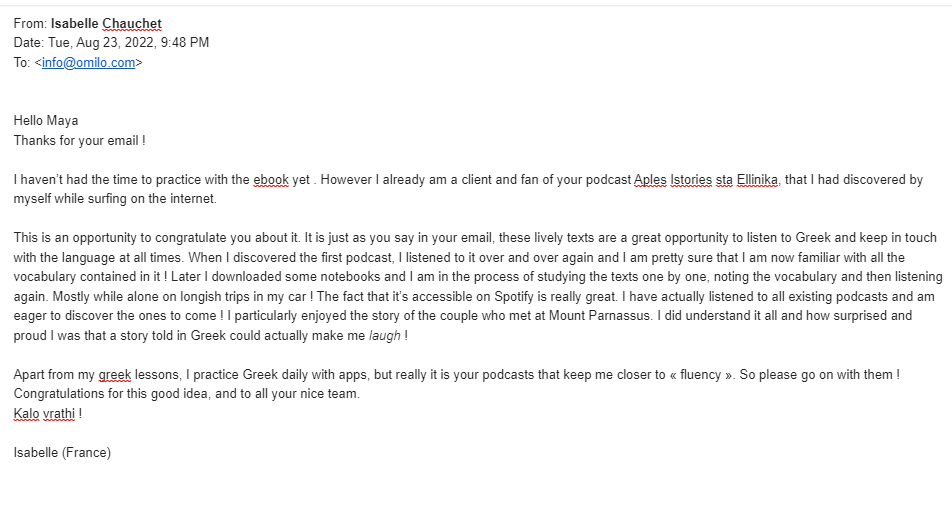made by Omilo
Which Greek eBook is right for you?
At Omilo, we know that every Greek learner is unique ; some love grammar, others prefer listening, and many just want to speak and be understood while enjoying Greek culture.
That’s why we’ve created a wide range of eBooks, designed to help you improve your Greek at your own pace and level.
Whether you’re a complete beginner, an intermediate speaker, or getting close to fluency, we love to help you out.
But we also know it can be confusing to choose the right material , especially since some topics (like proverbs or songs) are enjoyable for everyone, no matter the level!
So to help you out, here’s an overview of our eBooks, organized by language level and learning focus.
Take a look below and find your next favorite Greek resource!
++++++++++++++++++
Where can you purchase those materials?
At Omilo, our main focus is organizing high-quality Greek language courses in Greece — with small groups, cultural activities, and personal attention.
Since we dedicate most of our time to teaching and supporting our students, or creating materials when we have no groups running,
we chose not to run a webshop ourselves.
Instead, all our eBooks are available through our trusted partner masaresi.com ;
an independent online shop specialized in Greek learning materials and cultural products.
On masaresi.com, you can easily:
-
Browse all the Omilo eBooks
-
Pay securely with debit or credit card
-
Download your materials instantly
This allows us to focus on what we do best — teaching Greek — while you still get fast and reliable access to the resources you need.
Visit masaresi.com to view all Omilo eBooks »
Ready?
Then scroll down and find the Best Materials for your level!
++++++++++++++++++++++++++++++++++++++++++++++++++++++++++++++++++++++++++++++++++++++++++++++++++++++++++++
Beginner (A1–A2)
If you’re just starting to learn Greek, or you know a few basic words and phrases but still feel unsure in conversations,
then you’re likely at the Beginner level (A1–A2).
At this stage, the focus is on:
-
Building simple vocabulary, daily Greek language
-
Learning everyday expressions or wishes, which you can use every day.
-
Understanding basic grammar, and how to conjugate verbs
-
Practicing pronunciation and reading
It’s the perfect time to develop a strong foundation, and the eBooks below are designed to help you do exactly that.
***************************************
eBooks for Beginner Levels
***************************************
-
Learn the Greek Alphabet!
-
If you do not master to read Greek yet, or know how to pronounce the words,
then this the eBook for you. When you want to learn Greek, then it all starts with the Greek alphabet!
→ https://masaresi.com/product/modern-greek-alphabet-course/ -
The Greek Speaking Starter Kit – Basic Sentences & Grammar
-
→ Learn how to form sentences, ask questions, and survive basic conversations.
–> https://masaresi.com/product/special-offer-beginners-starterkit/ -
Greek Wishes for Social Occasions
-
→ Learn how to say easy wishes, used at various occasions during the year
–> you can download this eBook for free –> https://omilo.com/for-free/free-ebook-audio-everyday-greek-wishes/ -
Learn How To Conjugate Greek Verbs of Group A, With Grammar Intro & Videos
- → Learn how to conjugate verbs of this category, with grammar explanations and useful sentences, + exercises and answer key
–> https://masaresi.com/product/verb-ebook-category-a/
-
Learn How To Conjugate Greek Verbs of Group B1 and B2 , With Grammar Intro & Videos
- → Learn how to conjugate verbs of those 2 categories, with grammar explanations and useful sentences, + exercises and answer key
–> https://masaresi.com/product/learn-how-to-conjugate-greek-verbs-b-category/ -
Boost Your Greek – Practice Books for A1–A2 Level
- –>This beginner-friendly eBooks helps you improve reading, vocabulary, grammar, and listening skills
through 20 practical exercises per eBook and engaging text.
Includes audio, video and answer key. Ideal for self-study or as extra support for your Greek course.
–> https://masaresi.com/product-category/ebooksgreek/boost-your-greek/
-
The Lydia (1) Easy Reader ; “A Summer In Greece”
- You can purchase the eBook or Hard Copy, as well as extra companion eBooks; verb book, workbook and vocab books
–> https://masaresi.com/product-category/ebooksgreek/easy-readers-in-greek/
Intermediate (B1–B2)
At the Intermediate level, you’re no longer a beginner . μπράβο!!
You can already handle basic conversations, read short texts, and understand the general idea of spoken Greek.
Now it’s time to:
-
Expand your vocabulary
-
Use more complex grammar (like verb tenses and cases)
-
Improve your listening and speaking confidence
-
Understand and join real-life conversations
The eBooks in this section will help you break through the “intermediate plateau” and move closer to fluency.
***************************************
eBooks for Intermediate levels
***************************************
-
Mastering Greek Prepositions
- → When it comes to forming sentences and thoughts in the Greek language, using the correct preposition is necessary. In this e-book, we will analyze some very important prepositions, their meaning, and their syntax. At the same time you will find examples of several sentences (translations in English included), exercises, and answer key.
https://masaresi.com/product/greek-prepositions/ -
The Lydia (2) Easy Reader; “A new life in Greece
- → Easy reader in Greek, intended for A2 – early stages of B1 Greek learners, and accompanied by the MP3 AUDIO-Book
Hard copy; https://masaresi.com/product/lydia-2-hardcopy/
eBook; https://masaresi.com/product/lydia-2-ebook/
-
«Φύγαμε για ελληνικά!»
-
→ Improve your Greek reading/listening skills and enrich your vocabulary while learning about Greek culture and everyday life in modern Greece! The book is also accompanied by MP3 down-loadable audio files. Intended for Intermediate Greek learners (B1-B2 levels).
available in Hard Copy or eBook format
Hard copy; https://masaresi.com/product/fygame-yia-ellinka-printed/
eBook; https://masaresi.com/product/fygame-yia-ellinika/ -
The Easy Greek Stories ( PODCAST /YouTube & NOTEBOOKS)
-
isten to the Omilo “Easy Greek Stories Podcast” for Intermediate Learners in Greek, and improve your Greek with the accompanying digital and printable notebooks, including Greek transcript, English translation, vocab list, grammar exercises, video link + Greek subtitles, and useful info about Greece related to the story.
Already 35 stories are written
For all links and info, go to https://omilo.com/podcasts/greek-stories/
You can also download a free sample at : https://omilo.com/for-free/easy-greek-stories-podcast-notebook/ -
Learn how to conjugate Greek passive verbs of C1 and C2 groups
- → This eBook is also useful for advanced levels, but when you are at Intermediate 2 level, you will start encounter those verbs.
Learn more about the passive verbs, the syntax phenomena, with videos, exercises, answer key, etc..
https://masaresi.com/product/conjugate-greek-passive-verbs/
-
Greek Songs
-
→ It is not always easy to understand Greek songs or its lyrics, but it is a fun way to boost your motivation to learn and understand Greek
Practice listening and vocabulary through popular, Greek songs, of all different genres
Info about all songs eBooks here; https://masaresi.com/product-category/ebooks-greece-and-greek-culture/greek-art-music/
Advanced (C1–C2)
If you’re at the Advanced level, you’re probably already using Greek regularly.
Maybe you are living in Greece, working, or visiting Greek very often, or just for the love of the language.
At this stage, your goals often include:
-
Understanding native-level content (news, stories, idioms)
-
Expressing opinions clearly and naturally
-
Refining your grammar and pronunciation
-
Sounding more like a native speaker
Our advanced eBooks are designed to challenge you, help you grow, and enjoy the richness of modern Greek language and culture.
***************************************
eBooks for Advanced Levels
***************************************
-
Advanced Greek Workbooks – Reading & Listening Practice
-
→ Authentic texts, audio, and exercises for advanced learners. Printable eBooks with Audio MP3file
For students that would like to improve their Greek, any time, any place.
Each workbook includes a text on a different topic, grammar and vocabulary exercises,
a crossword, and answer key to all exercises.
All info about the 7 workbooks here; https://masaresi.com/product-category/ebooksgreek/advanced-greek-workbooks/
The first Workbook is available for free—> https://omilo.com/for-free/advanced-workbook/ -
Greek slang
-
→ Learn many words and expressions of the everyday Greek slang. From the busy streets of Athens to the villages,
from the amphitheaters to the crowded tavernas, Greek slang is a part of Greece.
https://masaresi.com/product/greek-slang/ -
Greece -The Ultimate Listening & Reading Comprehension eBook
-
→ Improve your Greek listening skills and reading comprehension. You can listen to the 12 audio files,
as well as read the 12 articles about different subjects related to Greece and Greek culture. Audio included as well as English translations.
https://masaresi.com/product/greece-the-ultimate-listening-reading-comprehension-ebook/ -
The Greek Songs eBooks are ideal for Advanced levels, with a lot of new vocabulary
- → Practice listening and vocabulary through popular Greek songs, of all different genres. Including listening exercises
Info about all songs eBooks here; https://masaresi.com/product-category/ebooks-greece-and-greek-culture/greek-art-music/
-
Learn how to conjugate Greek passive verbs of C1 and C2 groups
- → Learn more about the passive verbs, the syntax phenomena, with videos, exercises, answer key, etc..
all info here;https://masaresi.com/product/conjugate-greek-passive-verbs/
-
Greek Compound Verbs and Prepositions, for Advanced Levels
-
→ deepen your understanding of Greek prepositions and the compound verbs you can form with them.
Starting with the meaning of key Greek prepositions, it lays the groundwork for mastering more complex verb structures.
Complete with exercises, an answer key, and English translations, this eBook is the perfect tool to refine your grammar and boost your vocabulary.
https://masaresi.com/product/compound-verbs-and-prepositions/
++++++++++++++++++++++++++++++++++++++++++++++
What do learners say about the Omilo eBooks?
Over the years, many students from around the world have used our eBooks to support their Greek learning journey.
Some students have attended a course in Greece, others used the materials with teachers abroad, and others use it to study by themselves from home.
Here’s what some of them have shared:
Hello Omilo-team
I would like to share how much I love your materials! Really and truly, I learn so much from them.
Sometimes I’m too quick to read them once and move on, when I should stick with one story longer, practicing it longer.
I have just about everything from your site. I really enjoyed the easy short story #12, about Φάνης και Ντίλαν. It made me laugh.
Thank you for all the work you all do to help us learn the beloved Greek language!
Regards, Lisa Efthymiou, USA
Since a few years my study-buddy and I practice Greek together via Skype. Now that we have reached a certain level in grammar, reading, writing and speaking, we find it important to make listening a spearhead. Because listening and understanding what is being said is the most difficult thing in a foreign language. But we want to practice in a fun way. Omilo’s Podcasts offer us that opportunity. They are fun stories, to listen to at different speeds. The stories are spoken by professional native speaker in a very nice way, so nice to listen to, and the exercises in the Notebook give us the depth we need. In addition, we also have a lot of fun with Figame sta ellinika. Fun listening exercises and varied challenging assignments. This keeps us motivated to keep improving our Greek. Thank you, Omilo!
ilse I, The Netherlands
+++++++++++++++++++++++++++++++++++++++++++++



